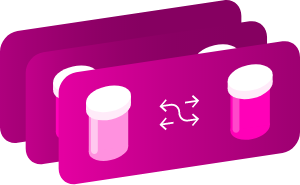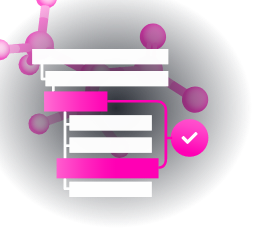Identification
- Summary
-
Obinutuzumabis an antineoplastic CD20 antibody used to treat untreated chronic lymphocytic leukemia in combination with chlorambucil.
- Brand Names
-
Gazyva
- Generic Name
- Obinutuzumab
- DrugBank Accession Number
- DB08935
- Background
-
Obinutuzumab is a humanized monoclonal antibody used as a combination treatment with chlorambucil to treat patients with untreated chronic lymphocytic leukemia. It was approved by the FDA in November 2013 and is marketed under the brand name Gazyva. There is a black box warning of fatal Hepatitis B Virus (HBV) reactivation and fatal Progressive Multifocal Leukoencephalopathy (PML).
- Type
- Biotech
- Groups
- Approved, Investigational
- Biologic Classification
-
Protein Based Therapies
Monoclonal antibody (mAb) - Protein Structure
-

- Protein Chemical Formula
- C6512H10060N1712O2020S44
- Protein Average Weight
- 146100.0 Da
- Sequences
- Not Available
- Synonyms
-
- Afutuzumab
- Obinutuzumab
- External IDs
-
- GA-101
Pharmacology
- Indication
-
Obinutuzumab is used as a combination treatment with chlorambucil to treat patients with untreated chronic lymphocytic leukemia.
 Reduce drug development failure rates构建、训练和验证机器学习模型
Reduce drug development failure rates构建、训练和验证机器学习模型
with evidence-based and structured datasets.Build, train, & validate predictive machine-learning models with structured datasets. - Associated Conditions
- Contraindications & Blackbox Warnings
-
 Avoid life-threatening adverse drug eventsImprove clinical decision support with information oncontraindications & blackbox warnings, population restrictions, harmful risks, & more.Avoid life-threatening adverse drug events & improve clinical decision support.
Avoid life-threatening adverse drug eventsImprove clinical decision support with information oncontraindications & blackbox warnings, population restrictions, harmful risks, & more.Avoid life-threatening adverse drug events & improve clinical decision support. - Pharmacodynamics
-
Obinutuzumab is more potent than rituximab in depleting B-cells, antitumor activity, and tumor regression.
- Mechanism of action
-
In contrast to rituximab, which is a classic type I CD20 antibody, obinutuzumab binds to type II CD20 antibodies. This allows obinutuzumab to have a much higher induction of antibody-dependant cytotoxicity and a higher direct cytotoxic effect than the classic CD20 antibodies.
Target Actions Organism AB-lymphocyte antigen CD20 antibodyregulatorHumans - Absorption
-
Obinutuzumab is administered intravenously, so its absorption is 100%.
- Volume of distribution
-
Obinutuzumab has a volume of distribution of about 3.8 L.
- Protein binding
-
Obinutuzumab does not bind to plasma proteins.
- Metabolism
-
Obinutuzumab is not metabolized by the liver.
- Route of elimination
-
The route of elimination of obinutuzumab was not indicated (FDA label).
- Half-life
-
obinutuzumab的半衰期是28.4天。
- Clearance
-
The clearance of obinutuzumab is 0.09L/day.
- Adverse Effects
-
 Improve decision support & research outcomesWith structured adverse effects data, including:blackbox warnings, adverse reactions, warning & precautions, & incidence rates.Improve decision support & research outcomes with our structured adverse effects data.
Improve decision support & research outcomesWith structured adverse effects data, including:blackbox warnings, adverse reactions, warning & precautions, & incidence rates.Improve decision support & research outcomes with our structured adverse effects data. - Toxicity
-
The most serious toxicities observed with obinutuzumab are Hepatitis B virus (HBV) reactivation and progressive multifocal leukoencephalopathy (PML). HBV reactivation can occur with all anti-CD20 antibodies and can result in hepatic failure, fulminant hepatitis, and death. PML occurs as a result of JC virus infection and can be fatal as well. Other common but less serious adverse reactions include infusion reactions (pre-treat with glucocorticoids, acetaminophen, and anti-histamine to prevent this), neutropenia, thrombocytopenia, and Tumor Lysis Syndrome (TLS) (pre-treat patients, especially with a high lymphocyte count and/or a high tumor burden, with anti-hyperuricemics and hydration). It is also recommended to NOT administer live virus vaccinations prior to or during obinutuzumab treatment.
- Pathways
- Not Available
- Pharmacogenomic Effects/ADRsBrowse all" title="" id="snp-actions-info" class="drug-info-popup" href="javascript:void(0);">
- Not Available
Interactions
- Drug InteractionsLearn More" title="" id="structured-interactions-info" class="drug-info-popup" href="javascript:void(0);">
-
This information should not be interpreted without the help of a healthcare provider. If you believe you are experiencing an interaction, contact a healthcare provider immediately. The absence of an interaction does not necessarily mean no interactions exist.
Drug Interaction Integrate drug-drug
interactions in your softwareAbatacept The risk or severity of adverse effects can be increased when Abatacept is combined with Obinutuzumab. Abciximab The risk or severity of adverse effects can be increased when Abciximab is combined with Obinutuzumab. Acebutolol Acebutolol may increase the hypotensive activities of Obinutuzumab. Acenocoumarol The risk or severity of bleeding and hemorrhage can be increased when Acenocoumarol is combined with Obinutuzumab. Acetylsalicylic acid The risk or severity of adverse effects can be increased when Acetylsalicylic acid is combined with Obinutuzumab. Adalimumab The risk or severity of adverse effects can be increased when Adalimumab is combined with Obinutuzumab. Adenovirus type 7 vaccine live The risk or severity of infection can be increased when Adenovirus type 7 vaccine live is combined with Obinutuzumab. Aducanumab The risk or severity of adverse effects can be increased when Obinutuzumab is combined with Aducanumab. Aldesleukin The risk or severity of adverse effects can be increased when Aldesleukin is combined with Obinutuzumab. Alefacept The risk or severity of adverse effects can be increased when Alefacept is combined with Obinutuzumab.  Identify potential medication risksEasily compare up to 40 drugs with our drug interaction checker.Get severity rating, description, and management advice.Learn more
Identify potential medication risksEasily compare up to 40 drugs with our drug interaction checker.Get severity rating, description, and management advice.Learn more - Food Interactions
-
- Avoid echinacea. Echinacea should be used with caution, if at all, in patients receiving therapeutic immunosuppressants. Monitor for reduced efficacy of the immunosuppressant during concomitant use.
Products
-
 Drug product information from 10+ global regionsOur datasets provide approved product information including:
Drug product information from 10+ global regionsOur datasets provide approved product information including:
dosage, form, labeller, route of administration, and marketing period.Access drug product information from over 10 global regions. - Brand Name Prescription Products
-
Name Dosage Strength Route Labeller Marketing Start Marketing End Region Image Gazyva Solution 25 mg / mL Intravenous Hoffmann La Roche 2014-11-28 Not applicable Canada Gazyva Injection, solution, concentrate 1000 mg/40mL Intravenous Genentech, Inc. 2013-11-01 Not applicable US Gazyvaro Injection, solution, concentrate 1000 mg Intravenous Roche Registration Gmb H 2020-12-16 Not applicable EU
Categories
- ATC Codes
- L01FA03 — Obinutuzumab
- Drug Categories
-
- Amino Acids, Peptides, and Proteins
- Antibodies
- Antibodies, Monoclonal
- Antibodies, Monoclonal, Humanized
- Antigens, CD20
- Antineoplastic Agents
- Antineoplastic Agents, Immunological
- Antineoplastic and Immunomodulating Agents
- Blood Proteins
- Cancer immunotherapy
- CD20 (Clusters of Differentiation 20) inhibitors
- CD20-directed Antibody Interactions
- CD20-directed Cytolytic Antibody
- Globulins
- Hypotensive Agents
- Immunoglobulins
- Immunoproteins
- Immunosuppressive Agents
- Immunotherapy
- MONOCLONAL ANTIBODIES AND ANTIBODY DRUG CONJUGATES
- Myelosuppressive Agents
- Proteins
- Serum Globulins
- Chemical TaxonomyProvided byClassyfire
-
- Description
- Not Available
- Kingdom
- Organic Compounds
- Super Class
- Organic Acids
- Class
- Carboxylic Acids and Derivatives
- Sub Class
- Amino Acids, Peptides, and Analogues
- Direct Parent
- Peptides
- Alternative Parents
- Not Available
- Substituents
- Not Available
- Molecular Framework
- Not Available
- External Descriptors
- Not Available
- Affected organisms
-
- Humans and other mammals
Chemical Identifiers
- UNII
- O43472U9X8
- CAS number
- 949142-50-1
References
- Synthesis Reference
-
Robak T: GA-101, a third-generation, humanized and glyco-engineered anti-CD20 mAb for the treatment of B-cell lymphoid malignancies. Curr Opin Investig Drugs. 2009 Jun;10(6):588-96.
- General References
- Not Available
- External Links
-
- KEGG Drug
- D09321
- PubChem Substance
- 347910388
- 974779
- RxList
- RxList Drug Page
- Drugs.com
- Drugs.com Drug Page
- Wikipedia
- Obinutuzumab
- FDA label
-
Download (484 KB)
Clinical Trials
- Clinical TrialsLearn More" title="" id="clinical-trials-info" class="drug-info-popup" href="javascript:void(0);">
-
Phase Status Purpose Conditions Count 4 Active Not Recruiting Treatment Advanced Follicular Lymphoma 1 3 Active Not Recruiting Treatment B-Cell Chronic Lymphocytic Leukemia (B-CLL) 1 3 Active Not Recruiting Treatment Chronic Lymphocytic Leukemia (CLL) 4 3 Active Not Recruiting Treatment Chronic Lymphocytic Leukemia (CLL)/Small Lymphocytic Lymphoma 3 3 Completed Treatment Chronic Lymphocytic Leukemia (CLL) 4 3 Completed Treatment Chronic Lymphocytic Leukemia (CLL)/Lymphoma, Small-Cell 1 3 Completed Treatment Non-Hodgkin's Lymphoma (NHL) 2 3 Not Yet Recruiting Treatment Chronic Lymphocytic Leukemia or Small Lymphocytic Leukemia (CLL or SLL) 1 3 Recruiting Treatment Chronic Lymphocytic Leukemia (CLL) 4 3 Recruiting Treatment Chronic Lymphocytic Leukemia (CLL)/Small Lymphocytic Lymphoma 1
Pharmacoeconomics
- Manufacturers
-
Not Available
- Packagers
-
Not Available
- Dosage Forms
-
Form Route Strength Injection Injection, solution Intravenous 1000 mg/40ml Injection, solution, concentrate Intravenous 1000 mg/40mL Solution Intravenous 25 mg / mL Solution Intravenous 1000 mg Injection, solution, concentrate Parenteral Injection, solution Intravenous Solution Intravenous 1000 mg/40mL Injection, solution, concentrate Intravenous 1000 mg Injection, solution, concentrate Intravenous; Parenteral 1000 MG - Prices
- Not Available
- Patents
- Not Available
Properties
- State
- Liquid
- Experimental Properties
-
Property Value Source water solubility Water soluble Not Available
Targets

insights and accelerate drug research.
- Kind
- Protein
- Organism
- Humans
- Pharmacological action
-
Yes
- Actions
-
AntibodyRegulator
- General Function
- Mhc class ii protein complex binding
- Specific Function
- This protein may be involved in the regulation of B-cell activation and proliferation.
- Gene Name
- MS4A1
- Uniprot ID
- P11836
- Uniprot Name
- B-lymphocyte antigen CD20
- 分子量
- 33076.99 Da
References
- Robak T: GA-101, a third-generation, humanized and glyco-engineered anti-CD20 mAb for the treatment of B-cell lymphoid malignancies. Curr Opin Investig Drugs. 2009 Jun;10(6):588-96. [Article]
- Schnaiter A, Stilgenbauer S: Refractory chronic lymphocytic leukemia--new therapeutic strategies. Oncotarget. 2010 Nov;1(7):472-82. doi: 10.18632/oncotarget.101103. [Article]
- Kyriakidis I, Vasileiou E, Rossig C, Roilides E, Groll AH, Tragiannidis A: Invasive Fungal Diseases in Children with Hematological Malignancies Treated with Therapies That Target Cell Surface Antigens: Monoclonal Antibodies, Immune Checkpoint Inhibitors and CAR T-Cell Therapies. J Fungi (Basel). 2021 Mar 5;7(3). pii: jof7030186. doi: 10.3390/jof7030186. [Article]
Drug created at January 05, 2014 20:42 / Updated at June 03, 2022 07:24




